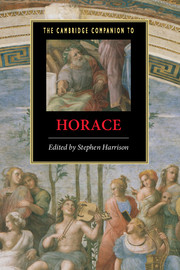Book contents
- Frontmatter
- Introduction
- Part 1: Orientations
- Part 2: Poetic Genres
- Part 3: Poetic Themes
- Part 4: Receptions
- 20 Ancient receptions of Horace
- 21 The reception of Horace in the Middle Ages
- 22 The reception of Horace in the Renaissance
- 23 The reception of Horace in the seventeenth and eighteenth centuries
- 24 The reception of Horace in the nineteenth and twentieth centuries
- Dateline of works and major political events
- Works cited
- Index
21 - The reception of Horace in the Middle Ages
from Part 4: - Receptions
Published online by Cambridge University Press: 28 May 2007
- Frontmatter
- Introduction
- Part 1: Orientations
- Part 2: Poetic Genres
- Part 3: Poetic Themes
- Part 4: Receptions
- 20 Ancient receptions of Horace
- 21 The reception of Horace in the Middle Ages
- 22 The reception of Horace in the Renaissance
- 23 The reception of Horace in the seventeenth and eighteenth centuries
- 24 The reception of Horace in the nineteenth and twentieth centuries
- Dateline of works and major political events
- Works cited
- Index
Summary
'Note that Horace wrote four different kinds of poems on account of the four ages, the Odes for boys, the Ars Poetica for young men, the Satires for mature men, the Epistles for old and complete men.' Every epoch will try to form its own image of the author behind a widely diffused school text, and medieval readers of Horace were no exception. The quotation belongs to a twelfth-century scribe who managed to compress one particularly influential medieval understanding of Horace the poet into a formula. Horace’s friend and fellow poet Virgil became famous in the Middle Ages for his all embracing prophetic wisdom, and their younger contemporary Ovid for a conflict with the Emperor Augustus that was intriguingly connected with his love-life. Horace was not the stuff that prophets or expert lovers are made of, but instead he became the embodiment of a typical human being who had lived through the stages of life and had written about them in turn for the benefit of people of his own age group. For medieval readers believed that the sequence of Horace’s works found in most complete manuscripts, the one outlined in the quotation, did in fact represent the chronology of Horace’s oeuvre, in the way that complete manuscripts of Virgil do. Moreover, a well-known passage in Horace’s Ars Poetica (156-78) speaks eloquently about the ages of man and how important it is for the poet to make individual characterisations of them. Therefore Horace had simply followed his own good advice both in his art and in his life.
- Type
- Chapter
- Information
- The Cambridge Companion to Horace , pp. 291 - 304Publisher: Cambridge University PressPrint publication year: 2007
- 9
- Cited by

